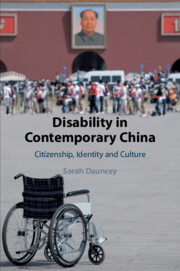Book contents
- Disability in Contemporary China
- Disability in Contemporary China
- Copyright page
- Dedication
- Contents
- Figures
- Acknowledgements
- A Note on Language
- Abbreviations
- Introduction
- 1 Where Did All the Disabled People Go?
- 2 Backstage to Centre Stage
- 3 Entertainment or Education?
- 4 A Narrative Prosthesis?
- 5 Blind, but Not in the Dark
- 6 Private Lives for Public Consumption
- Conclusion
- References
- Index
3 - Entertainment or Education?
Disability and the Cinematic Imagination
Published online by Cambridge University Press: 18 September 2020
- Disability in Contemporary China
- Disability in Contemporary China
- Copyright page
- Dedication
- Contents
- Figures
- Acknowledgements
- A Note on Language
- Abbreviations
- Introduction
- 1 Where Did All the Disabled People Go?
- 2 Backstage to Centre Stage
- 3 Entertainment or Education?
- 4 A Narrative Prosthesis?
- 5 Blind, but Not in the Dark
- 6 Private Lives for Public Consumption
- Conclusion
- References
- Index
Summary
Chapter 3 turns to the culture of the early reform period to examine three films – Youth (Qingchun, 1977) and Venus (Qimingxing, 1991), directed by Xie Jin (1923–2008), as well as Mother (Mama, 1991) directed by Zhang Yuan (b. 1963). Youth marked the first major reappearance of disability in mainstream culture and provides the starting point for an examination of the return of disability to the screen. While the chapter demonstrates that these new representations continued to reflect notions of difference, and that even children were expected to ‘overcome’ their impairments to make a contribution to ‘mainstream’ society, it also reveals the significance of personal motives (for example, those of Xie Jin, himself the father of two children with learning impairments) in bringing disability back into the public eye. We see the difficulties of moving beyond the ‘personal tragedy’ narrative even when disabled people and their families have the opportunity to represent their understandings of what it means to be disabled. The particular vulnerability of children as shown in these films, equally, works to reassure the able-bodied gaze that ideologies of normalcy remain intact and unchallenged.
- Type
- Chapter
- Information
- Disability in Contemporary ChinaCitizenship, Identity and Culture, pp. 86 - 109Publisher: Cambridge University PressPrint publication year: 2020



